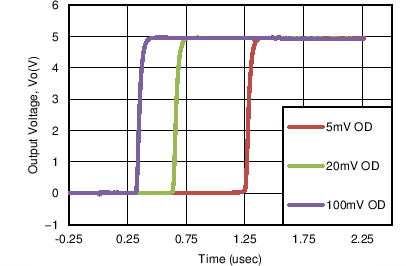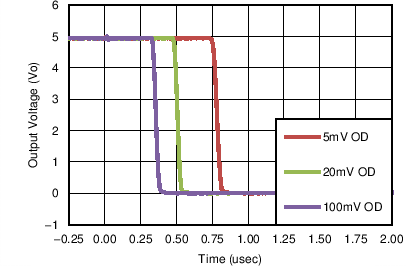ZHCSLD4K August 1999 – September 2023 TL331 , TL331B , TL391B
PRODUCTION DATA
- 1
- 1 特性
- 2 应用
- 3 说明
- 4 Revision History
- 5 Pin Configuration and Functions
-
6 Specifications
- 6.1 Absolute Maximum Ratings, TL331 and TL331K
- 6.2 Absolute Maximum Ratings, TL331B and TL391B
- 6.3 ESD Ratings, TL331 and TL331K
- 6.4 ESD Ratings, TL331B and TL391B
- 6.5 Recommended Operating Conditions, TL331 and TL331K
- 6.6 Recommended Operating Conditions, TL331B and TL391B
- 6.7 Thermal Information
- 6.8 Electrical Characteristics, TL331B and TL391B
- 6.9 Switching Characteristics, TL331B and TL391B
- 6.10 Electrical Characteristics, TL331 and TL331K
- 6.11 Switching Characteristics, TL331 and TL331K
- 6.12 Typical Characteristics, TL331 and TL331K
- 6.13 Typical Characteristics, TL331B and TL391B
- 7 Detailed Description
- 8 Application and Implementation
- 9 Device and Documentation Support
- 10Mechanical, Packaging, and Orderable Information
8.2.3 Application Curves
The following curves were generated with 5 V on VCC and VLogic, RPULLUP = 5.1 kΩ, and 50 pF scope probe.
 Figure 8-2 Response Time for Various Overdrives (Positive Transition)
Figure 8-2 Response Time for Various Overdrives (Positive Transition) Figure 8-3 Response Time for Various Overdrives (Negative Transition)
Figure 8-3 Response Time for Various Overdrives (Negative Transition)